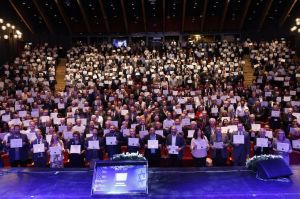Avatar: Rambo in Reverse
If you can get a theater full of people in Kentucky to stand and applaud the defeat of their country in war, then you've got some amazing special effects.
I just left opening night of James Cameron's gazillion-dollar epic film Avatar. The reviews were right. The plot is laughably cliched. And the special effects are the most jaw-dropping you've ever seen. What I wasn't quite ready for was the preachiness of the propaganda.
The medium was George Lucas; the message Che Guevara. At one point in the movie, Southern Seminary student Daniel Patterson turned to me and said, "This is Perelandra meets Jurassic Park." Yes, and then it became Rambo… in reverse.
First of all, from the preemptive war talk to the "blood for oil" theme to the napalm in the jungles to the "shock and awe," the film couldn't have been less nuanced. The American military was pure evil, while the Pandoran tribespeople were nature-loving, eco-harmonious, wise Braveheart smurf warriors.
Now, when it comes to issues of war and peace, I don't mind a message to the movie. American citizens can and do disagree about whether Vietnam or the Iraq War were right. Christians disagree about whether these wars were just (and many would argue they were just but unwise).
Some who believe the wars were warranted and just still oppose some of the tactics used. And most who oppose going to war in some of these places, still hope for their country to win those wars once they're entered.
For this film, there was no argument here, no appeal, no real narrative though. Just propaganda mediated through some "shock and awe" technology.
And in the end, a group of people (including some, I'm sure, who love the counter-propaganda on their local country music station about such things) stood and applauded as the "wicked" U.S. military went down, quite literally, in flames.
Of course, James Cameron is the same man whose moving images and music caused theaters full of "family values" Christians to tear up and cheer two teenagers fornicating in an abandoned car on the RMS Titanic.
Despite my eye-rolling here, I'm not really all that bothered. Propaganda isn't dangerous, after all, when we know it's propaganda.
Still, movies of all sort ought to remind us of the power of images, and what they can lead us to think and feel. Wonder how much propaganda we're latching on to without ever even knowing it's there?



























